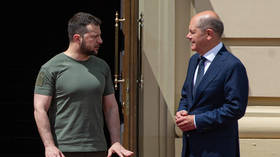Fyodor Lukyanov: How the Green Party has turned Germany Eastern European

For decades, Germany has been an example of pragmatism within a common system, where Berlin (and previously Bonn) didn’t set the rules, but was left with an undeniable niche, in which it could pursue its own interests. That meant that despite being an ally of the US, it could maintain friendly relations with Moscow.
The country is now moving into a qualitatively different area – that of Russia’s main opponent.
As a chronicler of such processes, it is interesting to observe how quickly a transition can take place from one type of “special relationship” to another, diametrically opposed, stance.
The general tone in the political atmosphere is now set by the Greens, and this party has, from the outset, been a collection of more or less lofty like-minded moralists. Therefore, in the spectrum of positions on Russia in NATO Europe, which are almost entirely negative but vary in intensity, Germany has now moved as much towards a conventional Eastern European stance as it had previously been a pillar of the normal Western European positioning.
The guarantee that relations with Russia will not return to any kind of normalcy after the Ukraine war means that there will not be even the minimum conditions for a return to the old economic model, i.e. there won’t be any reverse in the “energy transition.”
This is the pragmatic basis for what is happening from the Green perspective.
The general Western system remains intact, but there is a fundamental difference from earlier times. In the past, in return for ceding all security rights and privileges to its senior partner, the US, Germany was allowed to operate its own commercial sphere of influence and it had permission to pursue economic expansion to the East. Now, in exchange for Washington’s promise to maintain the security umbrella, Berlin is prepared to abandon its previous understanding of pragmatism, radically change its economic system in a direction that suits the US, and take on a greater share of the military burden.
As a result, efforts to educate the German elite in the principles of unconditional Atlanticism, in which enormous effort has been invested for decades, are now paying off 200%.
Add to this the fact that Berlin is becoming the main center of the Russian anti-Kremlin diaspora, for both objective and subjective reasons, and you have a perfect picture of a 180-degree turn. Or, to use the Greens Minister for Foreign Affairs Annalena Baerbock’s own terminology, 360 degrees.












